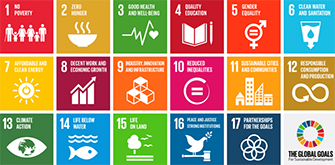Library Guides
- Victoria University
- Library Guides
- SDGs and the VU Library
- VU Library Involvement
Australian university libraries support the sustainable development goals particularly through contributing to the education of students and the research and teaching undertaken. Members of the Council of Australian University Librarians (CAUL), Victoria University Library facilitates the attainment of the SDGs as outlined in the following document.
The 'VU Library Services Strategy 2021-2023' and 2021 Annual Plan pursues a transformational agenda to:
In 2019 Victoria University Library was involved in the publication of the Sustainable Development Goals Report 2019.
As noted on the website "The Council of Australian University Librarians (CAUL) has released a report identifying the contribution of Australian university libraries to the United Nations Sustainable Development Goals.

The report details the important role that university libraries play in national and international development. Innovative services support education, training, and research, and economic development and growth.
Around 48 million visits were made to university libraries in 2018. Students, staff, alumni and the wider community benefit attended more than 480,000 digital literacy and information courses, developing new capabilities."

VU Library provided an exemplar relating to Goal 4: Quality Education. Here is the text of that:
New teaching for equity
Librarians are key partners in the transformation of teaching at Victoria University, Melbourne.
For over 100 years, degrees have been taught more or less the same way around Australia and abroad.
However, times have changed and so have industry and employer needs. Students are expected to graduate with practical, real-world applicable skills, able to handle the stresses that come with everyday working life.
That’s why at Victoria University the new First Year Model has been developed with student success in mind.
Since 2018, the first year of all bachelor degrees taught at the Melbourne campuses will see units delivered in a more focused way, one at a time. Students have more one-on-one time with their educators as they complete each unit and a significantly more immersive, collaborative and enriching learning experience.
The model is designed to ease transition into university life. It not only develops skills as a confident and independent learner, but also sets you up for success for the rest of your degree and beyond.
The Block Model of teaching has improved educational outcomes for students particularly for students from lower socioeconomic, non-English-speaking and indigenous backgrounds. It has provided more opportunities for active and collaborative learning. Librarians are involved in curriculum design teams, including the areas of unit design, development, delivery and review.
Library-developed and facilitated learning activities in the areas of Inquiry and Digital Literacy complement the core curriculum. Students are provided with strategies on how to find, evaluate, and use information to succeed in their studies. The Inquiry and Digital Literacy sessions also focus on 21st century skill development with a view to future study or career success.
Following the success of the initial year, the block model has been extended to second year, and will eventually include all years.
